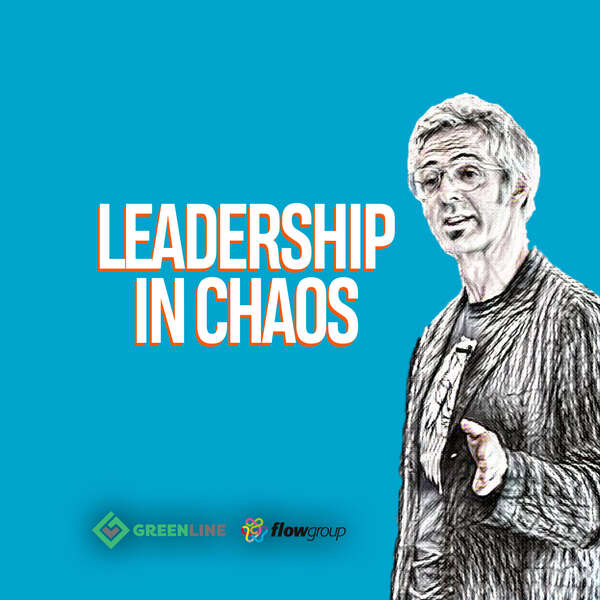Hi, I’m Ian McLean, founder of Flow Group and GreenLine Conversations. This podcast has grown out of the chaos that’s been thrust upon us. And in it, I share the best of 25 years of helping leaders in business organizations deal and cope with change. So, as you’re out there, busy making sense of it all, trying to cope, and repurposing your organisations, I’m hoping that some of this will provide some help, some of the time.
I’ll keep it deliberately short, because I know you’re busy. Let’s dive in.
One of the greatest joys of being around in business for the last 30 years is the boomerang client. These are people who you’ve worked with previously who come around again and are on their second or third or maybe even, in our cases, Sometimes fourth incarnation of companies and places that they are working.
And one of the greatest delights is when you get a spontaneous phone call, looking to reconnect, to explore working together again on a new piece of work. This, may I say, is happening more frequently and with a surprising level of frequency. and I can recommend it very highly as a business development strategy.
This happened relatively recently when an old client called up out of the blue who just relocated and repositioned herself in a new company. We first filled in some blanks about the past and what had been going on in life in between times. And then she gave me a brief description of the opportunity with the new client and the new location that she was present.
But it didn’t take long before we went back and reflected on the work that I had done with her previous employer. She wasn’t that senior at the time, she’d moved up the ranks subsequently, so she wasn’t directly involved in the work that I was doing. We, the Flow Group, had done one significant piece of work with this client which had had a really powerful impact.
However, after the initial phase of the work, all we got in return was radio silence. The leadership subsequently failed to engage with us at any level and without explanation. So at a certain point, we just moved on. So to satisfy my own curiosity, I asked my new client who had worked there at the time for an explanation.
Here was her reply. She said, most of us really loved it. In fact, it’s why I’m back here with you today in my new company. But to be honest, you were just getting too close to the truth. And leadership didn’t like it. You see, this whole idea about truth, everybody values truth, integrity, and authenticity.
Nobody’s going to say that they don’t. But not everybody is prepared to pay the price. One of my favorite things to do with a group is to ask the question, hands up here, who wants change? And practically every hand goes up. I follow it with a second question. Keep your hand up if you want to change. Many of the hands come down, accompanied by some very sheepish expressions.
The Swedish psychologist Klaus Jansson, the author and originator of The Four Rooms of Change, divides people into two types. One are the truth seekers. The second are the conformists. In parody, the conformists wear a shirt and tie. The truth seekers wear nose rings. For the truth seekers, the only thing that matters is seeking and finding the truth, and they will and are prepared to pay a price personally for the sake of it.
Conformists, on the other hand, well, they will suffer the discontent or the discomfort of some uncomfortable truth for the sake of complying, fitting in, and not standing out. Life and society is filled with both, and so are business organizations. In fact, many of the culture wars that we see out there in teams, in organizations, in departments are literally a battle between the two ideologies.
And all over our work with the organizations and the businesses that we work with, we see a combination of this play out all the time. The truth seekers and the conformists.
So I guess one question is, which are you? Do you put up with some discomfort that you know just for the sake of keeping the peace and fitting in? Do you do it in your personal life? Do you do it with your team? Do you do it in the organization? Or are you somebody who’s like a dog with a bone, who wants to seek out the real truth, what’s underlying things, and you’re persistent to a point of personal impact on you?
Do you face up to the inconvenient truth? Or do you play with the convenient lie? This, by the way, is not a judgment. It’s just something provocative to reflect upon. And I’m going to leave you, as always with the new series, with a couple of reflective questions for you to entertain. So here’s the question, and then it divides into two halves.
Where in your life, in your work, in your leadership, would you, could you benefit from being more truthful?
And then the sub question to the first question is, Wherever that is, what’s the cost to you of doing that? But also, what’s the benefit? And I’m not saying life can be just put down into a cost benefit analysis because this could be emotional cost and emotional benefit. It’s not just pounds and pence.
This whole question of how we deal with truth is very central to the work that we do with our businesses and organizations and teams and leaders. So, if you’re interested, Please do get in touch, connect with me on LinkedIn.
And in the meantime, stay safe, stay sane, and stay connected.

